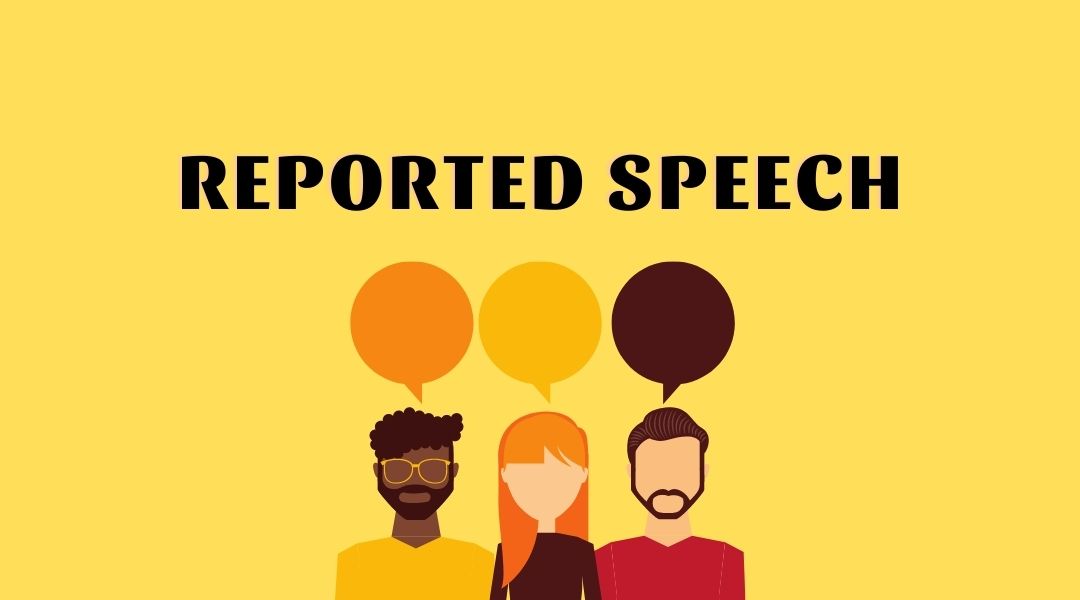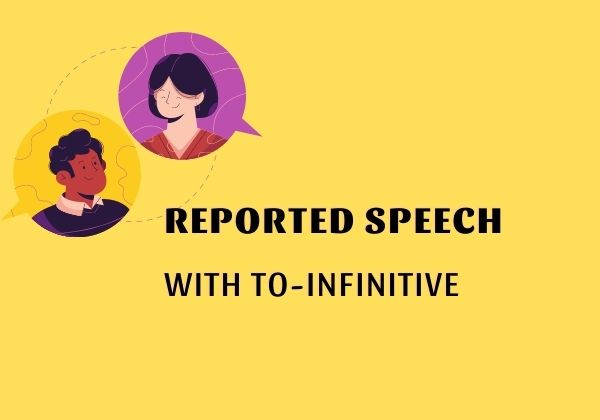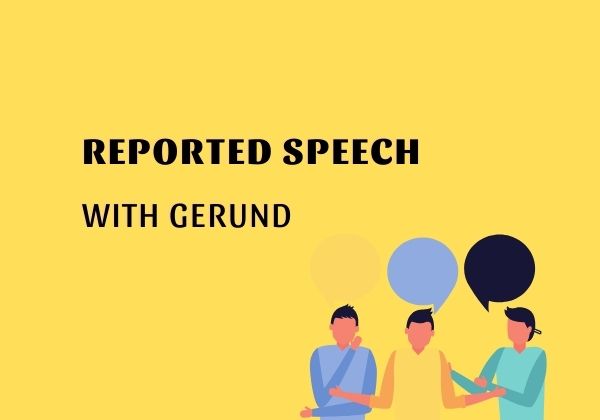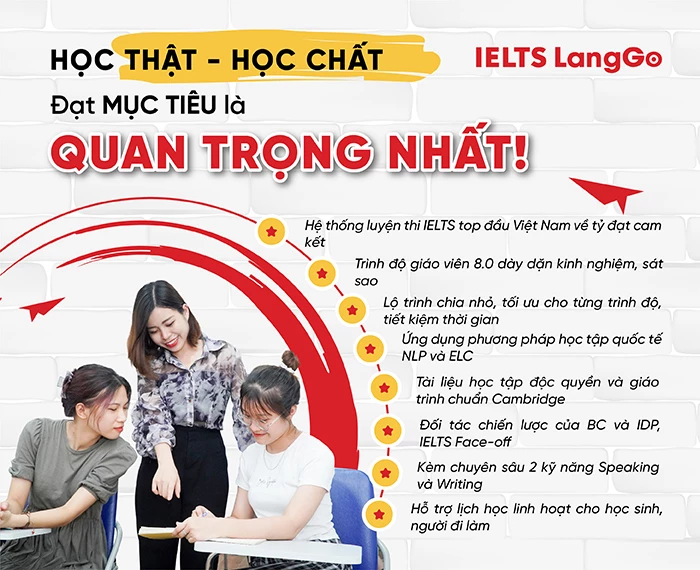


Để bắt đầu chặng đường chinh phục điểm số IELTS cao, bạn cần xây dựng cho mình một nền tảng ngữ pháp thật chắc chắn và vững vàng. Trong giao tiếp tiếng Anh nói chung và trong bài thi IELTS nói riêng, câu tường thuật đặc biệt là một chủ điểm ngữ pháp được ứng dụng rất phổ biến.
Do đó, bạn cần nắm chắc kiến thức về loại câu này. Vậy câu tường thuật đặc biệt là gì? Các dạng của câu tường thuật đặc biệt là gì? Bài viết dưới đây của LangGo sẽ giải đáp giúp bạn những thắc mắc đó!
Trong tiếng Anh, câu tường thuật (câu gián tiếp, câu trần thuật) được gọi là Reported speech. Với từ “Reported”, chắc hẳn bạn đã đoán ra được chức năng của loại câu này. Trong các cuộc hội thoại thường ngày hoặc trong các bài phát biểu, câu tường thuật được người nói sử dụng để thuật lại một hành động, một lời nói của một người nào đó.
Nói cách khác, câu tường thuật giúp bạn gián tiếp kể lại một sự việc. Ví dụ, một người bạn A nói với bạn rằng anh ấy muốn đi xem phim ngay khi rạp chiếu phim mở lại. Sau đó, bạn muốn kể lại sự việc này cho một người bạn B của bạn, thì bạn sẽ phải sử dụng câu tường thuật như sau: “A said he wanted to go to cinema.” Đó là cách câu tường thuật được sử dụng.
Câu tường thuật nói chung và dạng đặc biệt của câu tường thuật nói riêng được ứng dụng rất rộng rãi trong văn nói. Trong một bài thi IELTS Speaking, bạn sẽ không thể nói trôi chảy, nói rõ ràng nếu không sử dụng câu tường thuật. Do đó, việc hiểu kỹ về dạng câu này rất quan trọng.
Trong một số trường hợp, cấu trúc của câu tường thuật có thể được thay đổi để phù hợp với ngữ cảnh nói và mục đích của người nói. Khi đó, ta sẽ có các câu tường thuật đặc biệt.
Nhìn chung, cấu trúc câu tường thuật đặc biệt thường được chia làm hai loại chính: Câu tường thuật với To-Infinitive và câu tường thuật với V-ing (Gerund). Hãy cùng tìm hiểu kỹ hơn về các dạng câu tường thuật đặc biệt này nhé!

Câu tường thuật đặc biệt với To-Infinitive
Câu tường thuật đặc biệt thường được rút gọn bằng cách kết hợp với To-infinitive. Công thức câu tường thuật đặc biệt với To-Infinitive được sử dụng cho những mục đích sau:
Khi muốn thuật lại một mệnh lệnh:
Cấu trúc: Told somebody (not) to do something
Ví dụ:
Direct speech: “Keep quiet!”, said the teacher.
Reported speech: The teacher told us to keep quiet.
Khi muốn thuật lại một yêu cầu:
Cấu trúc: Asked somebody (not) to do something
Ví dụ:
Direct Speech: “Please, don’t bring food in the car”, the driver said.
Reported Speech: The driver asked me not to bring food in the car.
Trong trường hợp câu trực tiếp là dạng câu hỏi yêu cầu bắt đầu bằng Will/Would/Can/Could, bạn cũng có thể áp dụng cấu trúc trên trong câu tường thuật.
Ví dụ:
Direct Speech: “Will you clean the room?”, my mother said.
Reported Speech: My mother asked me to clean the room.
Khi muốn thuật lại một lời khuyên:
Cấu trúc: Advised somebody (not) to do something
Ví dụ:
Direct Speech: “You should study hard for the exam”, my friend said.
Reported Speech: My friend advised me to study hard for the exam.
Trong trường hợp câu trực tiếp chứa các cấu trúc “You’d better” hay “If I were you” thì bạn vẫn có thể áp dụng cấu trúc câu tường thuật đặc biệt trên.
Ví dụ:
Direct Speech: “ You’d better study now”, she said.
Reported Speech: She advised me to study then.
Khi muốn thuật lại một lời hứa:
Cấu trúc: Promised to do something
Ví dụ:
Direct Speech: “I will buy you a new car”, my husband said.
Reported speech: My husband promised to buy me a new car.
Khi muốn thuật lại một lời đe dọa:
Cấu trúc: Threatened to do something
Ví dụ:
Direct speech: “Give me all your money or I’ll kill you”, said the robber.
Reported speech: The robber threatened to kill me if I didn’t give him all my money.
Khi muốn thuật lại một lời cảnh báo:
Cấu trúc: Warned somebody (not) to do something
Ví dụ:
Direct Speech: “Don’t move. There’s a bomb”, he said.
Reported Speech: He warned me not to move since there was a bomb.
Khi muốn thuật lại một lời mời:
Cấu trúc: Invited somebody to do something
Ví dụ:
Direct Speech: “Do you want to come to the party?”, my boyfriend said.
Reported Speech: My boyfriend invited me to come to the party.
Khi muốn thuật lại một lời nhắc nhở:
Cấu trúc: Reminded somebody to do something
Ví dụ:
Direct Speech: “Don’t forget to close the window”, my father said.
Reported Speech: My father reminded me to close the window.
Khi muốn thuật lại một lời động viên:
Cấu trúc: Encouraged somebody to do something
Ví dụ:
Direct Speech: “Keep going! You can win the competition”, my teacher said.
Reported Speech: My teacher encouraged me to keep going.
Khi muốn thuật lại một lời khẩn cầu:
Cấu trúc: Begged/implored somebody (not) to do something
Ví dụ:
Direct Speech: “Please, Don’t leave me alone”, my friend said.
Reported Speech: My friend begged me not to leave.
Khi muốn thuật lại một sự tự nguyện:
Cấu trúc: Offered to do something
Ví dụ:
Direct Speech: “Could I help you?”, the waiter said.
Reported Speech: The waiter offered to help me.
Khi muốn thuật lại một sự đồng ý:
Cấu trúc: Agreed to do something
Ví dụ:
Direct Speech: “I will give you a second chance”, Tom said.
Reported Speech: Tom agreed to give me a second chance.

Câu tường thuật đặc biệt với V-ing (Gerund)
Trong nhiều trường hợp, câu tường thuật đặc biệt còn được sử dụng với các động từ đặc biệt và không cần phải tuân theo cấu trúc thông thường. Khi đó, động từ chính sẽ được chia dưới dạng V-ing. Dưới đây là một số trường hợp bạn cần sử dụng câu tường thuật đặc biệt với V-ing:
Khi muốn thuật lại một lời buộc tội:
Cấu trúc: Accused somebody of doing something
Ví dụ:
Direct Speech: “You broke my phone, Joe”, Nancy said.
Reported Speech: Nancy accused Joe of breaking her phone.
Khi muốn thuật lại một lời thừa nhận:
Cấu trúc: Admitted doing/having done something
Ví dụ:
Direct Speech: “I didn’t go to school yesterday”, James said.
Reported Speech: James admitted not going/having gone to school last day.
Khi muốn thuật lại một lời phủ nhận:
Cấu trúc: Denied doing/having done something
Ví dụ:
Direct Speech: “I don’t steal your money”, she said.
Reported Speech: She denied stealing/having stolen my money.
Khi muốn thuật lại một lời xin lỗi:
Cấu trúc: Apologized (to somebody) for doing something
Ví dụ:
Direct Speech: “I’m sorry I broke your car”, Lisa said
Reported Speech: Lisa apologized for breaking my car.
Khi muốn thuật lại một lời khen ngợi:
Cấu trúc: Congratulated somebody on doing something
Ví dụ:
Direct Speech: “Congratulations! You achieved your target”, my friend said.
Reported Speech: My friend congratulated me on achieving my target.
Khi muốn thuật lại một sự quả quyết, khăng khăng:
Cấu trúc: Insisted on doing something
Ví dụ:
Direct Speech: “I must invite her to my party”, Luke said
Reported Speech: Luke insisted on inviting her to his party.
Khi muốn thuật lại một lời đề nghị:
Cấu trúc: Suggested doing something
Ví dụ:
Direct Speech: “Let’s visit HCM city this summer”, Ken said.
Reported Speech: Ken suggested visiting HCM city that summer.
Ngoài ra, khi câu trực tiếp có cụm từ “Why don’t you” với ý nghĩa đề nghị, gợi ý, ta cũng có thể sử dụng cấu trúc trên để diễn đạt trong câu trần thuật.
Ví dụ:
Direct Speech: “Why don’t you go to the cinema with us?”, She said.
Reported Speech: She suggested going to the cinema with them.
Khi muốn thuật lại một lời cảm ơn:
Cấu trúc: Thanked somebody for doing something
Ví dụ:
Direct Speech: “Thank you for your interesting answer”, the teacher said.
Reported Speech: The teacher thanked me for answering her question.
Khi muốn thuật lại một lời cảnh báo:
Cấu trúc: Warned somebody against (doing) something
Ví dụ:
Direct Speech: “Don’t trust her”, my friend said.
Reported Speech: My friend warned me against trusting her.
Khi muốn thuật lại một sự đổ lỗi:
Cấu trúc: Blamed somebody for doing something
Ví dụ:
Direct Speech: “You caused this mess!”, my girlfriend said.
Reported Speech: My girlfriend blamed me for causing that mess.
Khi muốn thuật lại một lời thú tội:
Cấu trúc: Confessed to (doing) something
Ví dụ:
Direct Speech: “I copied your assignment”, Jane said.
Reported Speech: Jane confessed to copying my assignment.
Khi câu trực tiếp bao gồm từ “Let”, câu tường thuật đặc biệt sẽ được viết lại với cấu trúc tương ứng với ý nghĩa của từ “Let” trong câu trực tiếp đó:
Nếu từ “Let” trong câu trực tiếp có ý nghĩa ra lệnh thì trong câu tường thuật đặc biệt cũng cần chứa các từ ngữ mang ý ra lệnh:
Ví dụ:
Direct Speech: “The staff doesn’t let me take photos in the museum”, she said.
Reported Speech: The staff said she should not/was not to take photos in the museum.
Nếu từ “Let” trong câu trực tiếp có ý nghĩa đề nghị thì trong câu tường thuật đặc biệt, ta có thể dùng từ “Suggest” hoặc cụm “Say + Should”.
Ví dụ:
Direct Speech: “Let’s go to the swimming pool this summer”, Minh said.
Reported Speech:
Minh suggested going to the swimming pool that summer.
Hoặc:
Minh said that we should go to the swimming pool that summer.
Nếu từ “Let” trong câu trực tiếp có ý nghĩa thờ ơ, không quan tâm:
Ví dụ:
Direct Speech:
“He wants to have a game console”, the brother said.
“Let him”, the mother answered.
Reported Speech:
The brother said that he wanted to have a game console and the mother didn’t mind.
Đối với câu điều kiện loại 2 và loại 3, câu tường thuật đặc biệt sẽ được giữ nguyên cấu trúc và động từ (không cần lùi thì), chỉ cần thay đổi chủ ngữ và tân ngữ.
Ví dụ:
Direct Speech: “If John hadn’t texted me, I would not have known the truth”, she said.
Reported Speech: She said that if John hadn’t texted her, she would not have known the truth.
Nếu từ “Must” trong câu trực tiếp có ý nghĩa ra lệnh, cấm cản, câu tường thuật đặc biệt sẽ được viết lại với cấu trúc “Would have to”.
Ví dụ:
Direct Speech: “You must finish the assignment before tomorrow”, the teacher said.
Reported Speech: The teacher said I would have to finish the assignment before the next day.
Nếu từ “Must” trong câu trực tiếp có ý nghĩa suy đoán, khuyên nhủ thì câu tường thuật đặc biệt sẽ giữ nguyên “Must”.
Ví dụ:
Direct Speech: “You must consider this offer”, my friend said.
Reported Speech: My friend told me that I must consider that offer.
Khi câu trực tiếp chứa từ “Needn’t”, câu tường thuật đặc biệt sẽ được viết lại với cấu trúc “Didn’t have to”.
Ví dụ:
Direct Speech: “You needn’t spend a lot of money on a bike”, she said.
Reported Speech: She said that I didn’t have to spend a lot of money on a bike.
Câu cảm thán có dạng:
How + Adjective + S + To be!
What + A/An + Adjective + V!
Trong trường hợp này, có thể sử dụng từ “Exclaim” cho câu tường thuật đặc biệt:
Cấu trúc: S + exclaimed + that + S + V(lùi thì) + O
Ví dụ:
Direct Speech: “How beautiful is she!”, my mom said.
Reported Speech: My mom exclaimed that she was so beautiful.
Trong trường hợp này, hãy dùng từ “Wish” cho câu tường thuật đặc biệt:
Ví dụ:
Direct Speech: “Merry Christmas!”, he said.
Reported Speech: He wished me a merry Christmas.
Viết lại các câu sau dưới dạng câu tường thuật đặc biệt:
1. “Don’t forget to water the flowers,” my mom told me.
My mom reminded..............................................................................................................................
2. “You’d better spend your money on useful things,” I said to my friend.
I advised.....................................................................................................................................
3. “Would you like to hang out with us tomorrow?” Mike said.
Mike invited ................................................................................................................................
4. “Please turn off the music, Han,” said Tom.
Tom begged................................................................................................................................
5. “Don’t hike this trail, boys,” said the local.
The local warned.............................................................................................................
6. “Don’t move or I’ll shoot you.” the robber.
The robber threatened......................................................................................................................
7. “Clean your room before I come back,” my dad said.
My dad told.......................................................................................................................................
8. “Shall I buy the dress for you?” he said.
He offered..................................................................................................................................
9. “I’ll never leave you alone. I promise,” he said to me.
He promised................................................................................................................................
10. “Would you like to visit my city?” John said.
John invited................................................................................................................................
11. “Remember to call me when you come home,” Mark said.
Mark reminded me......................................................................................................................
12. “You should relax for a while, John,” Jane said.
Jane advised...............................................................................................................................
13. “Have a nice day!” Tom said to Sophia.
John..................................................................................................................
14. “What a pretty dress,” George said.
George exclaimed........................................................................................................................
15. “Let’s take a look,” Jim said.
Jim.......................................................................................................................................
16. “Don’t touch this ancient vase,” Peter said.
Peter warned .................................................................................................................................
17. “Read this book carefully before you do exercises,” he said.
He advised................................................................................................................................
18. “Will you give me a hand, please?” she said.
She asked.................................................................................................................................
19. “You needn’t go this way,” he said.
He said...................................................................................................................................
20. “He must come home before 9 p.m” my aunt.
My aunt said.......................................................................................................................
21.“Why don’t we hang out for dinner?” said Linda.
Ms. Linda suggested………………………………………………………..................................
22.“Sorry I broke your bike,'' my friend said.
My friend apologized...………………………………………………..................................
23.“I didn’t make this mistake”, said Bob.
Bob denied………………………………………………………..............................................
24.“You stole my bag” said Rose to Henry.
Rose accused………………………………………………………........................................
25.“I must see her once more,” he cried.
He insisted………………………………………………………..............................................
26.“Congratulations! You win this game”, the staff said
The staff……………………………………………………….......................................
27. “It’s your fault. You waste my money” Mary said.
Mary blamed .………………………………………………….....................................
28.“It was kind of you to give me many useful examples,” Lisa said.
Lisa thanked ……………………………………………………….........................................
29. “I lied,” Dick said.
Dick confessed ...………………………………………...........................................
30.“You broke the glass,” said Peter.
Peter blamed ………………………………………………………..................................
31. “Let’s invite your girlfriend to dinner,” he said.
He suggested……………………………………………………….........................................
32.“You stole two bikes,” the staff said to Jim
The staff blamed .......………………………………………………................................
33.“I fell in love with Jennie at the first sight,” the man said.
The man admitted………………………………………………………...................................
34.“I’m sorry I damaged your laptop, Nicky,” said Bob.
Bob apologized……………………………………………………….....................................
35. “Thank you for inviting me to the party,” John said.
John thanked………………………………………………………........................................
36. Carol said, “Why don’t we go to the museum this weekend?”
Carol suggested………………………………………………………..................................
37. “I’m sorry I forgot the homework” Dave said to the teacher.
Dave apologized………………………………………………………..................................
38. “Why didn’t you remind me about this event?” he said to me.
He accused………………………………………………………..........................................
39. “Don’t go near this forest,” Tony said to the children.
Tony warned……………...……………………………………….........................................
40. “I’m sorry. I played the game for 2 hours”, my son said.
My son admitted………………………………………………………....................................
Đáp án:
1. My mom reminded me to water the flowers.
2. I advised my friend to spend her money on useful things.
3. Mike invited me to hang out with them the next day.
4. Tom begged Han to turn off the music.
5. The local warned those boys not to hike this trail.
6. The robber threatened to shoot me if I moved.
7. My dad told me to clean my room before he came back.
8. He offered to buy the dress for me.
9. He promised not to leave me alone.
10. John invited me to visit his city.
11. Mark reminded me to call him when I come home.
12. Jane advised John to relax for a while.
13. John wished Sophia a nice day.
14. George exclaimed that the dress was pretty.
15. Jim suggested taking a look.
16. Peter warned me not to touch that ancient vase.
17. He advised me to read that book carefully before I did exercises.
18. She asked me to give her a hand.
19. He said that I didn’t have to go that way.
20. My aunt said he would have to come home before 9 p.m.
21. Ms. Linda suggested hanging out for dinner.
22. My friend apologized to me for breaking my bike.
23. Bob denied making that mistake.
24. Rose accused Henry of stealing her bag.
25. He insisted on seeing her once more time
26. The staff congratulated me on winning that game.
27. Mary blamed me for wasting her money.
28. Lisa thanked me for giving her useful examples.
29. Dick confessed to lying.
30. Peter blamed me for breaking the glass.
31. He suggested inviting my girlfriend to dinner.
32. The staff blamed Jim for stealing two bikes.
33. The man admitted falling in love with Jennie at first sight.
34. Bob apologized to Nicky for damaging her laptop.
35. John thanked me for inviting him to the party.
36. Carol suggested going to the museum that weekend.
37. Dave apologized to the teacher for forgetting the homework.
38. He accused me of not reminding him about that event.
39. Tony warned children against going near that forest.
40. My son admitted playing the game for 2 hours.
Trên đây là toàn bộ kiến thức mà bạn cần nắm vững về câu tường thuật đặc biệt trong bài thi IELTS. Hy vọng bài viết của LangGo sẽ giúp bạn học tập hiệu quả hơn!



ĐẶT LỊCH TƯ VẤN MIỄN PHÍ LỘ TRÌNH Săn ƯU ĐÃI lên tới 12.000.000đ